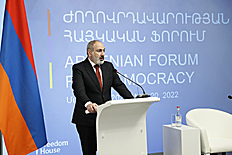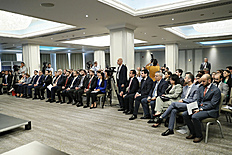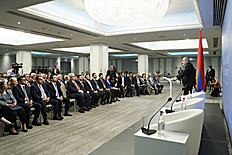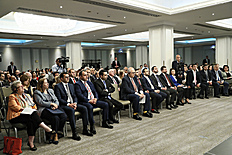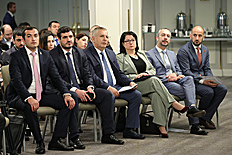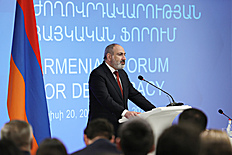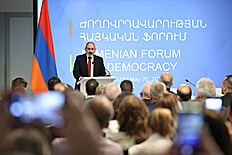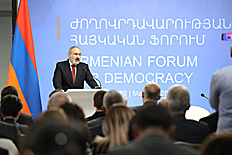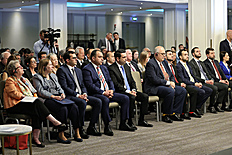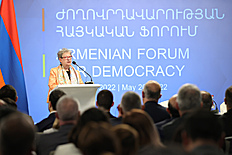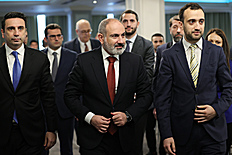Press releases
Today, the citizen is the key guarantor of democracy in the Republic of Armenia. Prime Minister Pashinyan
more 8 photos
Prime Minister Nikol Pashinyan participated in the "Armenian Forum For Democracy". The event was also attended by the President of the National Assembly Alen Simonyan, the President of the Constitutional Court Arman Dilanyan, Vide Presidents of the National Assembly Hakob Arshakyan, Ruben Rubinyan, MPs, members of the Government, Head of the EU Delegation to Armenia, Ambassador Andrea Wiktorin, Ambassador Extraordinary and Plenipotentiary of the USA to Armenia Lynne Tracey,Director for Europe and Eurasia programs at Freedom House Marc Behrendt, representatives of civil society and experts.
At the beginning of the event the Prime Minister delivered remarks.
“Honorable President of the National Assembly,
Honorable President of the Constitutional Court,
Distinguished members of the Government,
Distinguished representatives of the judicial system,
Distinguished Members of the National Assembly,
Your Excellencies Ambassadors,
Dear representatives of Freedom House,
Dear guests,
Dear compatriots,
Ladies and gentlemen,
First, I want to salute the holding of the “Armenian Forum For Democracy”. I think that the Republic of Armenia is the right place to hold a forum with this title, and even the right time to hold this forum. It is held under the right title, because I usually say that democracy is the main international brand of the Republic of Armenia. Usually when I make this statement I refer to the reports published by various international organizations, but since there are many people here who are related to those publications, reports, I want to look at the issue from the opposite side, because reports are important, but not the most important, because reports are not the cause, but the result. I want to state that if referring to democracy in the Republic of Armenia I refer to the reports of international organizations, now I want to refer to the citizen of the Republic of Armenia when talking about democracy, because the most important institution of democracy in the Republic of Armenia is the institution of citizen. I think that today the citizen is the key guarantor of the democracy of the Republic of Armenia. And this is because of the fact that the citizen of the Republic of Armenia knows that he is a decision maker, he is the main and core decision-making subject, as envisaged by the Constitution of the Republic of Armenia.
What is the general difference between a citizen of a democratic country and a citizen of a non-democratic country? I think there is a very important difference. The citizen of a democratic country feels more responsible, therefore, the citizen of a democratic country spends more time thinking, pondering, analyzing, because every citizen in a democratic country feels, sees and knows his responsibility for today, yesterday and future.
Therefore, I want to say that after the 44-day war in 2020, the Republic of Armenia went through great shocks, and it was the citizen of the Republic of Armenia who prevented the collapse of the statehood of the Republic of Armenia, the loss of sovereignty and independence. I do not know to what extent it can be included in the protocol of today's event, but since the conference is called "Armenian Forum For Democracy", I would like us to applaud the citizen of the Republic of Armenia, who is the pillar of democracy in the Republic of Armenia.
I think that there are two very important questions which we need to answer. The first one is to what extent democracy is capable to protect and preserve the country’s security and to what extent democracy is capable to protect and preserve the country’s sovereignty and independence. I think that I already gave the answer to the second question and this question that today democracy is the most important and key factor for guaranteeing and preserving the sovereignty and independence of the Republic of Armenia. The answer to the second question is unequivocal: I already gave the answer that today democracy is the most important, key factor in preserving and guaranteeing the sovereignty and independence of the Republic of Armenia. And our task is to prove that, yes, democracy is capable to ensure the country’s external and domestic security. In this respect I want to emphasize and highlight the peace agenda adopted by the Government of the Republic of Armenia and for which the citizen of the Republic of Armenia gave a mandate.
In general, I think that the formulation of the peace agenda and its discussion is very important also in the logic that eventually, the citizen makes the key decisions in the country, as I said, in accordance with the democracy rules, the Constitution and the legislation. It’s very important that we give complete and proper information to the citizen so that he/she is informed enough while making decisions.
In general, when we often refer to issues related to the peace agenda, the negotiation process, the history, some people interpret it as a debate between the former and current authorities. This has nothing to do with it. I, our government, our political team consider it our duty to provide the citizens with enough and proper information about what happened to us, so that the citizen has the proper understanding of the problems, has enough information, and in the future he will be able to make the decisions that he has to make. By the way, it’s also based on the analysis of that information that the citizen of the Republic of Armenia made the decisions he made.
I have to say the following publicly today. You know, today we are talking about democracy in the Republic of Armenia, and there are people in this hall with whom we have fought at different times, maybe independently, maybe separately, sometimes together, to establish democracy in Armenia. And we have accomplished our mission, although we have not completed it. But I want to state that now, in order to strengthen democracy, it is very important that we unite around another mission: in the way we brought democracy to the Republic of Armenia, in the same way we should bring peace to the Republic of Armenia, because I think that democracy and peace can exist without each other with great difficulty. And at least I can say with joy and pride that there is a political power in the Republic of Armenia, which is united around this mission.
I think that all democratic forces in Armenia should gather around this mission because one is the continuation of the other. Of course, this doesn’t mean that we should have the same opinion and vision on all issues, but I think that at this stage it is highly important that we sincerely, looking into the eyes of each other, analyze the history of the past 30 years of our country and be able to do this in an atmosphere of sincerity and honesty, looking into the ayes of each other, and democracy creates sufficient conditions for this. Therefore, the continuation of our mission for democracy is our mission for peace which is much heavier, much more difficult and requires much more strength and will. I believe and I am convinced that we will implement this mission as well because if there is no belief, there will also be no readiness to take and bear the responsibility.
However, no matter how much we talk about our democracy, we must state that our democracy is not cloudless, because we face two groups of problems. The first group of problems is faced by all democracies in the world. That problem is the use of democracy against democracy. You know that all democracies in the world today face this challenge. This is the phenomenon when we use democratic principles to destroy democracy. And along this way, we need to document our strategy on how to overcome this challenge. And my greatest conviction is that the best way to overcome these challenges is to build democratic institutions and the democratize state institutions literally in the sense known to all of us, the operation of state institutions on the basis of professionalism, legitimacy, transparency, and accountability.
One of our biggest challenges today, of course, is the judiciary, we have been criticized by many in this room for failing to make progress in its reforms. We think that this criticism is objective, it is justified, although we also criticize ourselves, but on the other hand we know more deeply the problems we are dealing with. Maybe some of our colleagues who criticize us know the problems just as deeply, but they still do not consider it an excuse, others do not know so deeply, and they do not consider it an excuse as well. But we are, of course, determined to follow this path; we must be consistent in this regard.
Dear Colleagues,
In conclusion, however, I would like to refer to international reports, two or three of which are very important to me. I must first state that according to the results of 2021, the Republic of Armenia has made a transition from electoral authoritarianism to electoral democracy in international reports. This is a key change. This means that the Republic of Armenia has made a transition from the second or first league of democracy to the highest league of democracy.
The next is the index of press freedom, where the Republic of Armenia has been making great progress since 2018, and that progress will continue. Freedom of the press is very important for the citizen of a democratic country to receive the information needed to make decisions. But we must also take care, and many democracies also face this problem, to be able to develop the media literacy of our citizens to the extent that they are able to distinguish false information from real information without additional administrative factors. We have a political problem here as well, we must definitely solve that problem. The institution of real media beneficiaries, real owners, should be accomplished so that people know where the information comes from, what purpose may it pursue. Moreover, it’s about both the government and the opposition. The issue is that the citizen should be maximally well informed about which source he uses.
The third fact that I want to specially emphasize is the density of the prison population, which I think really does not get much attention, but it says a lot about the nature of the country. According to the results of 2021, the Republic of Armenia is second only to one European country in terms of prison population density: that European country is Monaco. Why do I say this? Because I think it’s an indicator. Also, due to the circumstances known to you, an attempt is made to present that the political team that came to power in a democratic way is trying to establish a dictatorship in the Republic of Armenia, is trying to carry out political repressions. I think the prison population density speaks for itself, because in countries that seek dictatorship, the prison population is increasing, not decreasing, the number of prisons is increasing, not decreasing. Therefore, I want to say that we have closed two penitentiaries during this period for two reasons. The first is that there is no need for these penitentiaries; the second is that these penitentiaries do not meet the standards we want to have. Of course, the others do not meet either, but unfortunately, at least today we cannot close them all. As our Minister of Justice puts it, he has set a task for us to have a dream penitentiary in Armenia. Of course, it sounds strange, but I still think it reveals our thoughts.
I would like to end my speech with a phrase that was impromptu recently born in the National Assembly of the Republic of Armenia: Long live Armenian democracy.
Thank you".
